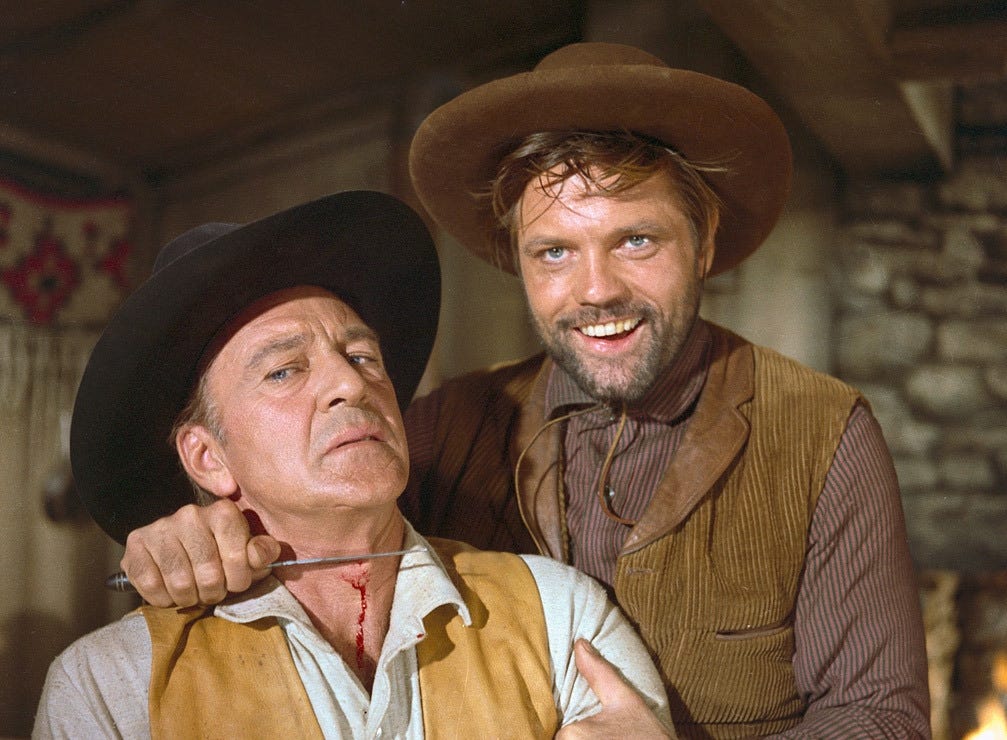Western Noir: Man of the West
The burden of guilt
I absolutely love Anthony Mann's dark 1950s westerns, most of them starring Jimmy Stewart. Winchester 73, Bend of the River, The Far Country, The Man from Laramie, and especially The Naked Spur. He took the lovable, genial star and injected him with moral doubt, cold fury, and violence. That's no surprise, given the excellent Noir films he made in the 1940s: T-Men, Raw Deal, and Border Incident to name a few.
Man of the West may be his darkest western and it stars Gary Cooper rather than Stewart, which turned out to be a smart change, given the character. It is Mann's penultimate western, following it a few years later with the epic Cimmaron. Many consider it his masterpiece, at least in the genre. This includes Jean Luc-Godard, who said: "each shot of Man of the West gives one the impression that Anthony Mann is reinventing the western, exactly as Matisse’s portraits reinvent the features of Piero della Francesca."
Well, anyway, it's a great Western Noir.
(spoilers) Cooper is traveling to Fort Worth to hire a teacher for the school back in his frontier town. He is carrying the combined savings of the residents to lure a candidate. While waiting for a train, he is spotted by a local marshal, who identifies him as a notorious outlaw. He gives a false name and is allowed to board the train. Here he meets a gambler (played by Arthur O'Connell) and saloon singer (played by Julie London); he considers offering the job of schoolmarm to the singer.
Unfortunately, at stop for water, the train is robbed by four outlaws, who knock out Cooper and steal the school money. The train takes off, leaving he and the gambler and singer behind. Cooper leads them to nearby ramshackle farm, where he hides the others in the barn and he heads inside the farmhouse.
There he finds the four outlaws who robbed the train. It turns out that they are members of his former gang and he actually is that notorious outlaw. The gang members include classic character actor Royal Dano and Hawaii Five Oh's Jack Lord (in a rare villainous role). A short time later the leader of the gang arrives, Dock Tobin (played by Lee J. Cobb). London and O'Connell are found in the barn and brought inside.
Cobb and his men use the farm as their hideout, living in squalor in the middle of nowhere. The gang is a grizzly bunch, including their raunchy leader. Very quickly they assault and strip London and brutalize O'Connell. Cobb uses them to convince Cooper to help him hold up a bank in a nearby town. He sends Cooper into scout things out, who finds out the town is nearly deserted and the bank is closed. He stays to ambush the gang members. During the ensuing shootout an innocent woman is killed before Cooper can kill the gang members.
Cooper returns to the hideout to find out that London was beaten and raped by Cobb while he was away. He hunts Cobb down and kills him, recovers the school money, and leads London back to civilization. The movie ends not with Cooper hiring London as a school teacher and riding off into the sunset, but him informing her he's married and will be returning to his wife without her.
There is very little respite in this movie from unrelenting gloom, squalor, and death. It's clear that Cooper's character did his share of murder during his outlaw days and while he's trying to go straight, his past still haunts him. Wiping out his former gang doesn't bring redemption as a lesser film might have done. Instead, he abandons London to her pessimistic future, dragging his guilt along home with him.
Whether Mann moved on to Cooper from Jimmie Stewart for Man of the West because of a falling out after their last movie together or not, Cooper is far better suited to portray a man burdened with unredeemable guilt. His eyes reflect a haunted sadness that I don't think Stewart could have conjured up. You can see that look in other Cooper films like High Noon or Vera Cruz.
According to Mann, he wanted to make the film even grimmer, but was held back by the producers. He favored replacing the character of the saloon singer with Cooper's wife, to increase the stakes. I'm not sure that was necessary; sexual assault and rape seems dire enough, regardless of the victim.
Like a later Neo-Noir, the color production supports the grim themes of the film. The settings of the hideout and the ghost town are painted as a combination of decay and raw, scorched desert, void of life and humanity.
One validation of the film's success as the darkest of Western Noirs? The National Legion of Decency labeled it as "morally objectionable."


Nice writeup. Though there is some of that "cold fury" and " moral doubt" in an earlier post WWII Stewart performance, if not the violence: its a wonderful life.